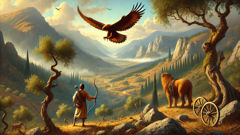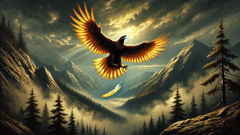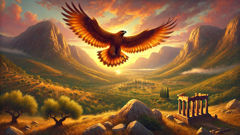Introduction
In the highlands of ancient Greece, where the mountains breathe stories into the sky and the valleys echo the footsteps of heroes, lived a creature so regal it seemed touched by the gods. The eagle, master of the azure dome, soared above olive groves and marble temples, its wings catching the sunlight like burnished gold. To the mortals below, the eagle was a symbol of power, wisdom, and the unyielding spirit of the land. Its cry pierced the silence of dawn, sending shivers through flocks of sheep and stirring awe in shepherds and philosophers alike. Legends whispered that eagles could fly closer to Olympus than any other living being, their eyes sharp enough to glimpse the secrets of the Fates themselves. This was a land shaped by myth, where every stone and stream bore witness to tales of hubris and humility, love and loss. In this cradle of civilization, the eagle ruled the sky, confident in its might and unchallenged by any rival. Yet, as the sun gilded the world in warmth and promise, shadows lengthened at its edges—shadows not cast by gods or monsters, but by the silent workings of fate and the choices that even the greatest among us make. Among the groves and mountains, another presence moved: a mortal, skilled with bow and arrow, driven by longing and the relentless desire to leave a mark upon the world. Where the eagle saw only dominion, the archer saw opportunity; where the eagle trusted in its own strength, the archer understood the fragile balance between glory and ruin. Their paths, as different as sky and earth, were set to cross in a moment that would echo through the annals of wisdom. This is the story of how pride takes flight, and how sometimes, in the tapestry of life, we weave our own undoing. The eagle’s journey is one of majesty and tragedy, a fable that asks us to look inward and consider how our strengths—if left unchecked—can become the very means by which we fall. And so, in the hush before destiny’s arrow is loosed, the wind carries a lesson for all who listen: beware the feathers you lend to fate.
The Sky’s Ruler
From the moment he first tasted the wind, Aetos had been destined for greatness. Hatched in a craggy nest high above the olive slopes, he was the pride of his kind—a golden eagle whose wingspan stretched wider than a man’s outstretched arms. His feathers glimmered with an amber sheen, each one barbed and sleek, catching the sunlight as he soared above the ancient land. Aetos ruled his domain with a confidence that bordered on arrogance, tracing vast circles over valleys where herds grazed and rivers twined like silver ribbons. To those who watched from below—the farmers tilling their fields, the shepherds guiding their flocks—he was more than a bird; he was an omen, a living banner of Zeus’s might and favor. Children pointed skyward when they saw his shadow sweep across the ground, whispering of legends in which eagles were the messengers of the gods. And Aetos, attuned to the reverence in their voices, grew bold and unafraid, convinced that nothing could challenge his reign.

Yet, in the silence of his solitary flights, there were moments when the world seemed to contract and tremble. The mountain wind, sharp as a blade, carried scents of pine and thyme—but also the faintest trace of something unfamiliar. Sometimes, as he glided near the edge of his territory, he caught glimpses of movement below: a figure draped in simple linen, hunched with purpose, eyes fixed not on the earth but on the sky. It was Eryx, a hunter of some renown, whose skills with bow and arrow were whispered about in the villages scattered at the foot of the mountains. Eryx was no ordinary man; he had learned patience from the olive trees, resilience from the rocks, and cunning from the foxes that slunk through the underbrush. But it was not prey he sought—it was immortality, a chance to become legend by bringing down the mightiest creature in the land.
Aetos, seeing the archer day after day, began to regard him with the mixture of contempt and curiosity reserved for threats not yet realized. The eagle’s pride would not allow fear, but deep in his breast stirred a nagging sense of unease—a whisper that perhaps even kings could fall. He circled higher, daring the archer to loose his shaft, believing himself untouchable, a flash of gold in the endless blue. Eryx watched, learning the eagle’s patterns: where he dove to hunt, when he rested on wind-worn ledges, how the sun gilded his wings in mid-afternoon. The hunter’s resolve was sharpened by failure; each missed opportunity only strengthened his commitment to the chase. While Aetos soared on currents of adulation, Eryx plotted quietly below, driven by a need to prove that even the divine could be brought low by mortal hands.
Seasons passed in this silent contest. Storms lashed the peaks, winter snows blanketed the pines, but neither eagle nor man yielded ground. Aetos’s victories grew more brazen—he plucked lambs from open meadows and scattered crows with a single scream. Eryx, meanwhile, grew lean and intense, honing his arrows with meticulous care, testing the balance of each shaft until it flew as true as his ambition. One dawn, as the sky blushed pink and gold, Eryx found something left behind—a single golden feather, shed by Aetos as he preened atop a rock spire. He picked it up, marveling at its resilience and beauty, and an idea struck him with sudden, chilling clarity. To defeat the eagle, he would use a piece of the eagle itself.
Carefully, reverently, Eryx bound the feather to his finest arrow, fletching it with a symbol of both honor and irony. He whispered an oath to the gods and to fate, knowing that this act would bind him forever to the bird he admired and envied. Meanwhile, high above, Aetos felt a strange tremor in the air, as if the world itself were holding its breath. He shook off the feeling with a shrill cry, wheeled through a shaft of sunlight, and dared destiny to do its worst.
Fate’s Arrow
As the days lengthened and spring painted the hillsides in wildflowers, the contest between eagle and archer grew more intense. Aetos had never flown more boldly, his heart swelling with each effortless glide across the realm he ruled. The world seemed made for him—the updrafts eager to bear him skyward, the sun itself bowing to illuminate his path. Yet, change drifted on the breeze. Eryx, with the patience of stone and the heart of a poet, had perfected his craft. He woke before dawn, studied the shifting winds, and carved his arrows with hands that trembled not from fear but anticipation. The golden feather he had found was no ordinary plume; it shimmered even in shade, a trophy of destiny as much as of chance. Eryx believed that by fletching his arrow with this feather, he might tip the scales of fate in his favor.

On the morning he chose to act, the valley lay cloaked in mist. A hush hung over the world, broken only by the distant bleating of goats and the hiss of dew evaporating from warm rocks. Eryx moved through the underbrush with a hunter’s grace, his every sense tuned to the silent signals of nature. He reached a clearing where he knew Aetos would pass—an open bowl ringed with wild thyme and pale stone. There he waited, breath shallow, arrow nocked and drawn.
Above, Aetos circled as he always did, his keen eyes searching for movement in the grass or glint on a rabbit’s fur. He spotted Eryx, a mere blur among the olive trees, and scoffed inwardly. How many times had he seen this man try and fail? How many arrows had fallen harmlessly to earth as he soared beyond reach? Yet this day felt different. Perhaps it was the angle of the sun, or the heavy scent of rain on the horizon, or a pang of foreboding that fluttered in his chest. Still, pride would not let him falter. He dipped low, teasing the archer with a flourish of wings, daring him to try once more.
Eryx exhaled, steadying his aim. The arrow—a masterwork of ash and sinew, its fletching bright as dawn—quivered with the promise of history. In that suspended moment, archer and eagle were united: both seeking glory, both haunted by fate’s unseen hand. Eryx released the bowstring. The arrow soared, slicing through layers of air and light, guided by a feather that had once belonged to its prey.
Aetos saw it too late. His eyes, so sharp that they could track a lizard across rocky ground from a mile away, failed him in that crucial instant. The arrow struck, burying itself deep in his breast. For a heartbeat, Aetos hung in the air—uncomprehending, wings wide and golden against the sky. Then pain seared through him, more profound than any wound he had ever known. He plummeted, tumbling from the heights in a slow, spiraling descent that seemed to last forever.
The world below watched as its king fell. Eryx dropped to his knees, overcome by awe and horror at what he had done. Around him, nature paused: birds stilled in their flight, rabbits froze among the thyme, and even the wind seemed to whisper condolences. When Aetos crashed to earth, his feathers splayed like rays around him, Eryx approached with trembling steps. He saw the arrow embedded in the eagle’s chest, saw the golden plume tied with care at its end, and understood the terrible irony. The eagle had been brought down by his own feather—his own pride, his own glory, transformed into a weapon.
Eryx wept for what he had achieved. He knelt beside the fallen king, his triumph soured by sorrow. All around, the world resumed its motion, but nothing would ever be quite the same. In the shadow of the mountains, an old lesson whispered on the wind: sometimes, we give our enemies the very tools they need to destroy us.
Conclusion
In the hush that followed the eagle’s fall, a new kind of silence settled over the mountains—a silence not born of awe or fear, but of understanding. The villagers who once looked up in reverence now bowed their heads in contemplation, speaking in quiet tones of what they had witnessed. Children asked why such a magnificent creature should fall, and elders answered with gentle wisdom: greatness can be its own undoing when pride blinds us to our vulnerabilities. The tale of Aetos and Eryx passed from mouth to mouth, growing richer with each telling. It became more than a story of hunter and prey; it became a lesson woven into the fabric of their lives. People remembered to temper ambition with humility, and to guard against lending their strengths to those who might turn them against them. Eryx never again lifted his bow against a creature of the sky. He honored the eagle’s memory by carving its likeness into stone, a silent reminder perched on a windswept crag above the village. And every spring, as the new eagles soared over the mountains, their cries carried a message that echoed through the ages: wisdom lies in knowing that what makes us mighty can also bring us low. Thus, in ancient Greece—and wherever stories are cherished—the fable endures, reminding each generation to look inward and recognize the feathers they give to fate.













